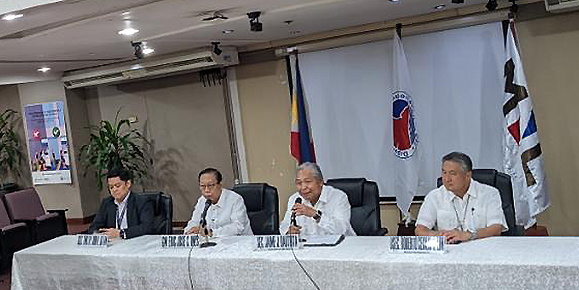
-
SMC SAP & Company Consortium has won the P170.6-billion contract for the Ninoy Aquino International Airport rehabilitation project
-
The consortium outbid two other groups, offering 82.16% of gross revenue to government
-
SMC SAP has until March 6 to comply with post-award requirements
-
Signing of the concession agreement is scheduled on March 15
-
The target start for operations and maintenance is September 11, 2024
-
The project is expected to generate around P900 billion or P36 billion per year of revenue for the national government in the course of the full 25 years of the concession
SMC SAP & Company Consortium has won the P170.6-billion contract for the Ninoy Aquino International Airport (NAIA) rehabilitation project.
The consortium submitted the highest bid amount, offering to share 82.16% of future gross revenue, excluding passenger service charges, with the government. It bested two other bidders, GMR Airports Consortium which offered 33.30% and Manila International Airport Consortium with the lowest offer of 25.91%.
The notice of award was issued to SMC SAP on February 16 following approval of the Manila International Airport Authority (MIAA) Board on the same day, Transport Secretary Jaime Bautista said in a press briefing.
San Miguel Corp, which holds a 33% share in the consortium, in a regulatory disclosure on the afternoon of February 16, however, said it has yet to receive the notice of award issued by DOTr.
SMC SAP consists of San Miguel Holdings Corp., RMM Asian Logistics, Inc.; RLW Aviation Development Inc., and Incheon International Airport Corp.
Asked whether SMC SAP’s revenue share offer may be “too good to be true”, Transport Undersecretary for planning and project development and PBAC chair Timothy John Batan during the same press briefing said solicited public-private partnerships have in the past shown the private sector’s efficiency and ingenuity.
He added that a detailed evaluation of the financial proposal has been conducted, checking its consistency with the technical proposal. SMC SAP’s funding sources have also been looked at to ensure it is able to deliver on its promise, he said.
Disputes arising from certain bidders going against other bidders, meanwhile, have all been resolved. The dispute resolution did not affect earlier findings on qualification and the outcome of the bidding, Batan said.
Bidding for the project was completed in just 12 months, one of the fastest–if not the fastest–for a solicited PPP, Batan noted.
Following the awarding of contract, SMC SAP has until March 6 to comply with post-award requirements.
Signing of the concession agreement is scheduled on March 15.
SMC SAP will be required to submit the upfront payment of P30 billion post-awarding of contract.
The target start date for operations and maintenance is September 11, 2024.
Bautista assured no NAIA employee will lose their job as those involved in operations will be absorbed by the concessionaire; those involved in regulatory operations will remain with MIAA.
The 15-year contract involves the rehabilitation, expansion and operation of NAIA to address long-standing capacity issues. The project aims to increase NAIA’s annual capacity to at least 62 million passengers from 35 million and enhance air traffic movement from 40 to 48 per hour.
The contract adheres to Republic Act No. 6957, as amended by Republic Act No. 7718 (Build-Operate-and-Transfer Law), and its 2022 revised implementing rules and regulations.
Under a rehabilitate-operate-expand-transfer arrangement, the winning bidder has 15 years–that may be extended by another 10 years–to enhance airport passenger terminals, airside facilities, develop commercial assets and utility systems, and provide surface access facilities for intermodal transfer, inter-terminal passenger transfer facilities, and services, among other obligations.
Once the concessionaire has taken over operations, Bautista said the public should expect improvements after a few months or by 2025.
Key performance indicators include shorter and more predictable waiting time at the check-in and immigration counters, availability in parking, improved security checks, availability of seats, time it takes for the baggage to be transferred from the aircraft belly to the conveyor belts, reliable operating escalators and passenger boarding bridges, among others.
The project is expected to generate around P900 billion or P36 billion per year of revenue for the national government in the course of the full 25 years of the concession. This is inclusive of the concessionaire’s P30 billion upfront payment, fixed annuity payment of P2 billion annually, and 82.16% government share.
By comparison, MIAA has remitted only P27 billion of dividends to the national coffers from 2010 to 2023.
Capital outlay for the project is at least P88 billion in the first six years, or P122.3 billion for the entire 25-year concession period. The estimated capital outlay is non-binding and may increase depending on the requirements, Batan noted.
MIAA general manager Eric Jose Ines said there will be an increase in NAIA rates but those will be minimal, noting the last time rates were hiked was in April 2000.
A public consultation on the proposed upward adjustment of fees and charges imposed by MIAA on the use of its services, facilities and equipment was held last February 12.
READ: 3 bidders pass technical evaluation, financial pre-evaluation for NAIA rehab project




